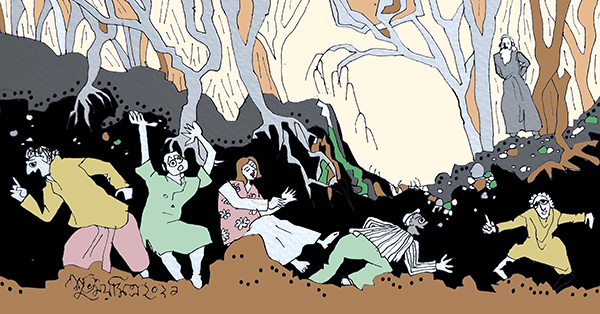
শান্তিনিকেতন ডায়েরি: পর্ব ১০
‘…অভিভাবকেরা আশা রাখতেন, বেয়াড়া-বেয়াদপ ছেলেদের কবির বিদ্যালয়ে পাঠালে তারা হয়তো একদিন যথার্থ মানুষ হয়ে ফিরে আসতে পারবে। এই বিদ্যালয় গড়ে তুলতে রবীন্দ্রনাথকে বহু ব্যক্তিগত ক্ষতি স্বীকার করতে হয়েছিল।’ আশ্রম ও কবি।

‘…অভিভাবকেরা আশা রাখতেন, বেয়াড়া-বেয়াদপ ছেলেদের কবির বিদ্যালয়ে পাঠালে তারা হয়তো একদিন যথার্থ মানুষ হয়ে ফিরে আসতে পারবে। এই বিদ্যালয় গড়ে তুলতে রবীন্দ্রনাথকে বহু ব্যক্তিগত ক্ষতি স্বীকার করতে হয়েছিল।’ আশ্রম ও কবি।
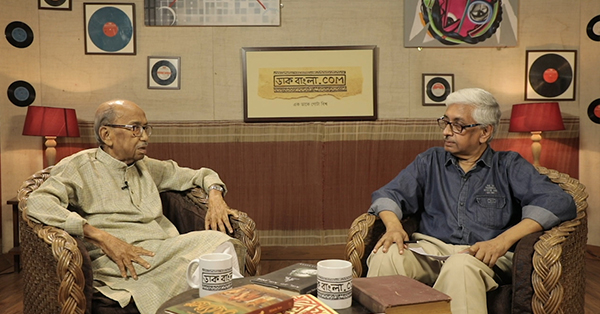
সিনেমার নেশা একদিন তাঁকে সত্যি-সত্যিই পরিচালক করে তুলেছিল! কিন্তু কেমন ছিল ওই যাত্রাপথ? সেই সব দিন-রাত্রির কথাই উঠে এল এই আলাপচারিতায়। ‘যাত্রিক’-এর ইতিহাস থেকে ভি শান্তারামের সান্নিধ্য, ‘পলাতক’ থেকে ‘ফুলেশ্বরী’র নির্মাণ-কাহিনি জানালেন তরুণ মজুমদার। সঙ্গে তাঁর সিনেমাভাবনা। কথোপকথনে শান্তনু চক্রবর্তী।
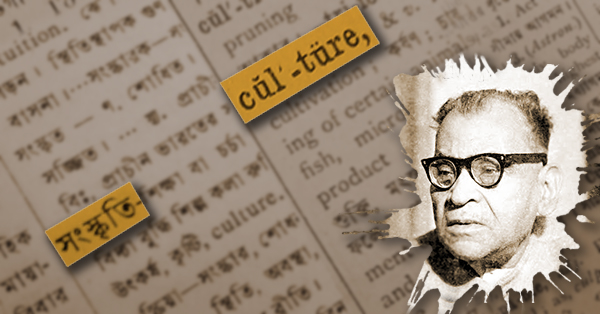
‘বিশ-তিরিশের দশকে রবীন্দ্রনাথ নাগাড়ে উপরোধ করেছিলেন একটি আগন্তুক ইংরিজি শব্দের বিকল্প বাংলা পরিভাষা খুঁজতে। শব্দটি: ‘কালচার’।… বিশের দশকের গোড়ায় সেই আকাঙ্ক্ষিত শব্দের উদ্বোধন ঘটালেন সুনীতিকুমার-ই৷ শব্দটি: ‘সংস্কৃতি’!’ ‘কালচার’ শব্দের বাংলা।
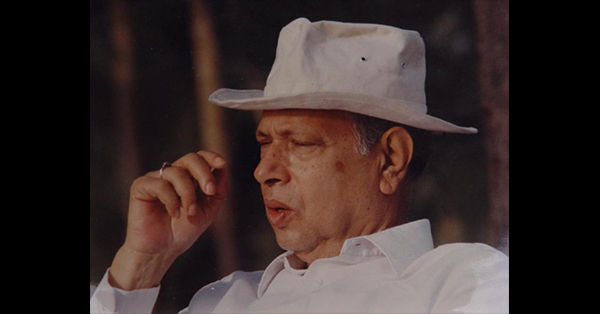
যে মানুষটি ‘গল্প হলেও সত্যি’র মতো জনপ্রিয় ছবি ভাবতে পারেন, তিনিই আবার নাটক থেকে নিয়ে ‘বাঞ্ছারামের বাগান’ ছবি করে তাক লাগিয়ে দেন। আমি যখন দেখা করি ওঁর সঙ্গে, সেই সময় উনি ‘বৈদূর্য রহস্য’ ছবিটি নিয়ে ভাবছেন। বাঙালির আত্মীয় তপন সিনহা।
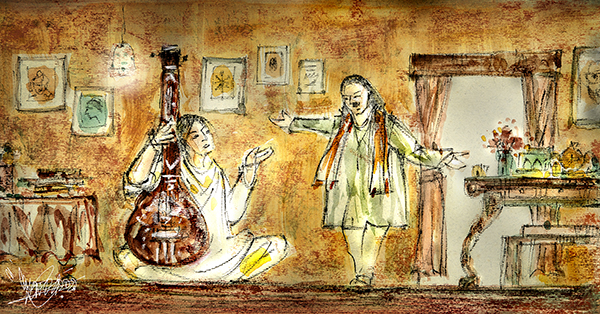
অনেকরকমের পৃষ্ঠপোষক আছেন, শিল্পীর সহায়তা বিষয়ে তাঁদেরও ধারণাও অনেকরকম। এবং সেই পৃষ্ঠপোষকরা তাঁদের মতো করে সৃষ্টিশীল হয়ে উঠতে পারেন বা হয়ে ওঠার চেষ্টা করতে পারেন, আর চূড়ান্ত ব্যর্থও হতে পারেন। মার্গসংগীতে পৃষ্ঠপোষকতার অবদান।

গায়িকা-গীতিকার বিরল শিল্পী, বিরল শিল্পী মৌসুমী ভৌমিক। কথায়-গানে, মননে, রাজনৈতিক সচেতনতায় মৌসুমী ভৌমিকের সৃষ্টি বাংলা গানের জগতে অনন্য, বহু ধারণা ভেঙে নতুন স্বপ্ন গড়ে তোলার অন্যতম উদাহরণ। যারা এখনও স্বপ্ন দেখি, এখনও গল্প লিখি, তাদের জন্য, নাগরিক অন্বেষণে, মৌসুমী ভৌমিকের গান।

কথা থাকবে না, শুধু ছবি। মানে কার্টুন, ব্যঙ্গচিত্র। অবশ্য শুধু ব্যঙ্গ কেন, থাকবে হিহি, খিলখিল, ঠোঁট টিপে মুচকি, একলা দোকলা ফোকলা হাসি। ব্যঙ্গচিত্র কখনও হবে বঙ্গ-চিত্র, কখনও স্রেফ তির্যক দৃশ্য। ছোট্ট ফ্রেম, বিশাল ক্যানভাস।

‘পৌরাণিক হিন্দুধর্মে মেনকার মতো অপ্সরারা বিশ্বামিত্রের মতো তপস্বীদের মোহগ্রস্ত করতেন, শিবকে গৃহস্থ-জীবনে প্রবেশ করতে বাধ্য করেন শক্তি। কিন্তু তান্ত্রিক হিন্দুধর্মে অপ্সরা হয়ে উঠলেন যোগিনী। যৌনতা এ-ধারায় পুলক বা শিশুর জন্ম দেওয়ার নিমিত্ত নয়, আধ্যাত্মিক শক্তিকে ধারণ করার আধার।’ হিন্দুধর্মে তন্ত্র-প্রভাব।

‘…The patron in question wanted to start a gharana named either after his place of birth or his family name, and only then would he put his money where his mouth was.’ The problem with patronage.

‘…দুজনের মনের মধ্যেই তখন একঘেয়েমির যন্ত্রণা। গীতা শিল্পী, সে গান-পাগল মেয়ে। আর ওদিকে গুরুও শিল্পী। সে সিনেমা-পাগল মানুষ। একদিন নেশার ঝোঁকে গীতাকে বিয়ে করে ফেলেছিল সকলের অনুরোধ-উপরোধ উপেক্ষা করে। তারপর যা হয়, ক্লান্তি নেমে এল।’ বিবাহ যখন যন্ত্রণা।

‘…In Tantrik Hinduism, the apsara becomes the yogini. Sex was not for pleasure or for children: it was to harness spiritual power. The point was to satisfy the woman without feeling the need to spill the semen (virya). Such control is what made the monk a hero.’ The journey of Tantra from India.
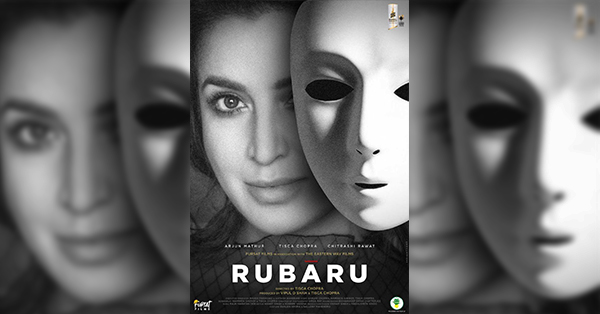
‘রুবারু’; ‘মুখোমুখি’। কীসের সম্মুখীন এই ছবির নায়িকা, অভিনেত্রী রাধা মালহোত্রা? বয়স বাড়ার সাথে-সাথে প্রত্যাখ্যানের ভয়? আকর্ষণ ম্লান হয়ে ওঠার এবং নিরাপত্তাহীনতার ভয়? নাকি বড় একা হয়ে পড়া, নিজের মস্তিষ্কের ভেতর লড়ে চলা একটা অবিরাম লড়াইয়ে ক্লান্ত হয়ে হাল ছেড়ে দেওয়ার ভয়? টিসকা চোপড়ার সময়োচিত স্বল্প-দৈর্ঘ্যের ছবি।
This Website comprises copyrighted materials. You may not copy, distribute, reuse, publish or use the content, images, audio and video or any part of them in any way whatsoever.
©2026 Copyright: Vision3 Global Pvt. Ltd.